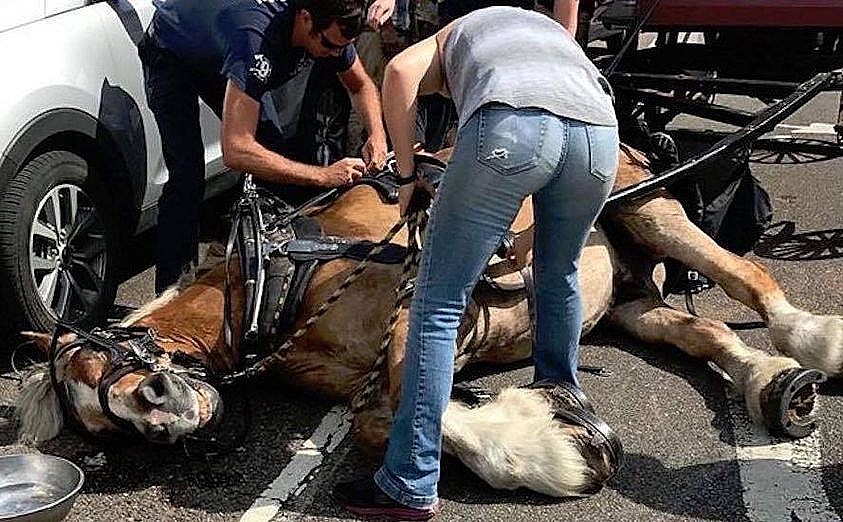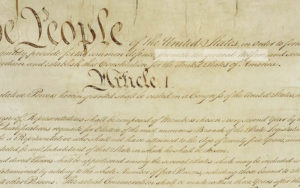
By Andy Brack | Imagine a development was coming to your neighborhood and you didn’t like it. So you attended a public meeting in your town and complained.
 Or consider the community advocacy organization that publishes a video about a fallen carriage horse in a continuing and long effort to get more humane treatment for working animals.
Or consider the community advocacy organization that publishes a video about a fallen carriage horse in a continuing and long effort to get more humane treatment for working animals.
In both cases, you’d probably figure their opinions were part of the public debate in the marketplace of ideas, protected by free speech rights in the U.S. Constitution that allow citizens to speak out, protest and publish information.
But in both instances, companies in South Carolina brought a special, cynical kind of lawsuit intended to chill debate by, in part, making people hire expensive lawyers to defend themselves. They’re called SLAPP lawsuits, which stands for “Strategic Litigation Against Public Participation.” More than 30 states have laws that protect people from these lawsuits. South Carolina does not.
In the first instance, a 2016 lawsuit by a developer over a Mount Pleasant project ended up being settled after citizens who commented on the process were subpoenaed. In the second, a Charleston County judge recently ruled the Charleston Animal Society did not defame a carriage company in 2017 by publishing videos of a fallen horse and saying it had “collapsed.” It took four years for the ruling to be issued, but the company has already appealed it.
In a 36-page order, Charleston County Master-in-Equity Mikell Scarborough ruled in May that “with the immense public interest in Charleston’s carriage horses and, specifically, the Big John [horse] incident, the video is a fundamental example of the type of public discourse protected by the First Amendment.”
The Electronic Frontier Foundation is among groups around the country trying to limit SLAPP lawsuits like the two brought in South Carolina.
“These lawsuits aren’t meant to win on the merits — they’re meant to put financial pressure on a defendant, thus quashing their constitutional rights,” the organization says.
 In an essay pushing for an anti-SLAPP law in South Carolina, University of South Carolina journalism professor Eric Robinson wrote the state has provisions against frivolous lawsuits, but that’s different from a lawsuit filed to chill speech.
In an essay pushing for an anti-SLAPP law in South Carolina, University of South Carolina journalism professor Eric Robinson wrote the state has provisions against frivolous lawsuits, but that’s different from a lawsuit filed to chill speech.
“Protection of speech about public issues is an important First Amendment principle, and we should strengthen that protection by barring frivolous lawsuits that use the threat of litigation – and its inherent expenses and risks – to shut down legitimate discussion of public issues and controversies,” he said. “South Carolina should bolster its protections for free speech by passing an anti-SLAPP statute in the near future.”
He’s right on the money.
EFF explains the importance of states like South Carolina passing such a measure, which has been introduced but not acted on in the past: “These laws apply broadly to expression on matters of public concern, in any forum. They require plaintiffs to show they have a legitimate case early on in litigation. If the defendant loses the anti-SLAPP motion, they have the right to an immediate appeal. And in cases where a judge finds that a defendant has been the victim of a SLAPP, that defendant is entitled to an award of costs and attorney fees.”
EFF and more than 25 organizations from the American Civil Liberties Union and Public Participation Project to the National Right to Life Committee and National Taxpayers Union, have signed a letter pushing for stronger anti-SLAPP legislation.
“Anti-SLAPP laws protect the public from frivolous lawsuits that arise from speech on matters of public concern. These laws protect speakers by providing special procedures for defendants to defeat weak or meritless claims. The stronger the statute, the more deterrence there is against filing SLAPP lawsuits.”
Hear, hear. This is a bipartisan proposal for Republicans and Democrats who want to protect free speech and to reduce pressure on citizens. They should get behind it now.
Andy Brack is editor and publisher of Statehouse Report and the Charleston City Paper. Have a comment? Send to: feedback@statehousereport.com.
















 We Can Do Better, South Carolina!
We Can Do Better, South Carolina!